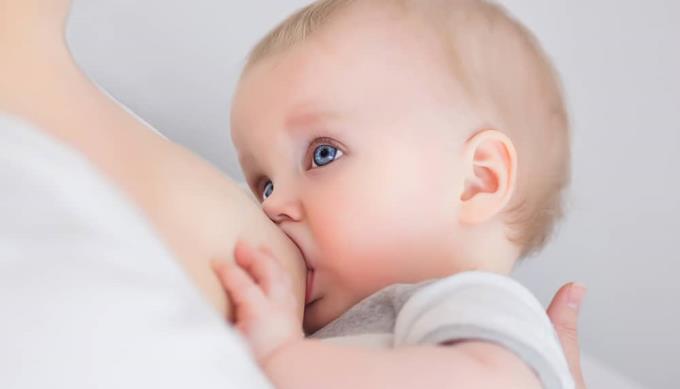Ways to determine an infants caloric needs

Learn how to determine your baby’s caloric needs, including the calories in breast milk and formula, to ensure your infant gets the right nutrition for healthy growth.
As a parent, you will surely feel extremely worried if your baby shakes his head repeatedly. But is that the fact that the child often shaking his head is related to a medical problem or is it just a sign that your baby is developing normally?
Throughout the first few years of life, babies will experience various milestones regarding their gross and fine motor skills and reflexes . When you see your baby begin to shake his head, you are psychologically concerned that something is wrong. Sometimes, you will wonder if it is too early for your child to learn that? In addition, a few cases of head shaking are associated with neurological or developmental disorders . In fact, most of them are normal. So why do children often shake their heads and when should parents worry?
Over the first year, babies have developed milestones related to reflex and motor skills: from the first smile, the first time they can suck their hands, the first time they can lift their legs and even Lovely babbling sounds too.
Then when you see your baby shake their head often, it makes you a little nervous. In most cases, by the time your baby turns one month old, he or she will be able to turn a little on her own. As the baby gets older, the skills will also increase accordingly, and the muscles around the neck develop to support turning.
Here are the most common reasons babies often shake their mothers' head:
Most babies move or shake their heads as part of body control. Your baby's muscles are developing and they want to explore to learn more about their bodies by imitating other people's actions. So do not be too concerned if you see your baby trying to shake his head, he is just learning and checking how his body works.
The act of shaking their heads is also a way for babies to calm themselves to sleep when they're tired. Such constant swinging causes dizziness and makes it easier for them to sleep. So if your baby shakes his head when he is sleepy, that is his or her own trick to be able to fall asleep faster.

Gingivitis and otitis media in a child can also sometimes cause the pendulum to feel more comfortable. It is quite common for a baby to shake his head from side to side during teething. If the mother is concerned about whether the child may have a fever, a cold or another health problem related to infection, when you notice that the baby shakes his head constantly, you should take him to the doctor.
If observed closely, babies often shake their heads when lying on their stomach or on their backs and sometimes this act is also how they interact with people. Between 6 and 8 months of age, you may find your child imitating the actions of everyone in the house.
Babies will sometimes be a little hyperactive and curious to know how much control they can control their bodies. When they are 5 to 6 months old, babies will shake their heads or even move their whole body. The reality is that it may seem a bit scary to see the baby shake its head repeatedly, but that's perfectly okay and this action is also the premise for the child to learn to sit.

Most babies will shake their heads as a sign of trying to hold on to the mother while nursing. Once used, the child shook his head even more excited. This will usually happen in the first trimester and it is meant to help your baby control his muscles reflex and learn to cling more easily.
When a child shakes his head repeatedly from side to side, it is not a sign of the child's neurological problems or autism. However, if your child has some other signs attached to it, then parents should take note.
These unusual behaviors in babies can be easily observed when they reach 18 months of age. And most mothers will have difficulty recognizing those signs when the baby is 3 years old. Here are some typical easy to recognize signs:
If the child does not interact much with family members or has no reflexes when other people call names or other sounds, have no emotional expressions, show interest, help is needed. medical terms. You should take your child to major hospitals with psychologists for evaluation.
A perfectly healthy child will have positive gestures or hand movements to communicate with everyone around. Most babies between 7 and 8 months old point to objects and also make sounds to express something they want to say. Children with neurological problems will not be able to use gestures appropriately and also have poor voice volume.
Children with mental illness will have worse language skills and understanding skills as they grow up. They make very little eye contact with people and rarely interact with those around them. At this sign, mothers should pay attention to observe the baby at the stage where the baby is 9 to 12 months old will be more clear.
Children with a mental illness may show repetitive movements or display some strange behaviors and show no excitement or signs of wanting to learn new things. You should take your child to the doctor if you notice that your child exhibits similar symptoms.

If you suddenly find your child banging his head against a wall, crib or even using his fist to hit the wall despite bruising his hand, then you should take him to the doctor as soon as possible. In addition, your baby may even shake his head violently during times of anxiety or often for a long time.
Child development milestones are also considered as a reference value so that parents can accurately assess their child's development, especially in the first years of life. Children 3 months old can turn a part, babies 7 months old can sit firmly, babies 9 months old can crawl ... These are important milestones of motor skills in children.
If it is found that your baby does not meet developmental milestones in accordance with his age, it is also a worrying sign that the child is at risk of mental illness.
The fact that children often shake their heads will make them feel sleepy or dizzy. The mother can follow the following tips to partly help your baby limit frequent shaking of his head:
Stop paying attention and not reacting when your baby is shaking his head will not stimulate him to do it any more.
You should also monitor how often and how often your baby shakes his head. This will help you figure out whether the head pendulum is a constant, repetitive phenomenon that is related to your attention.
Sometimes some factors in the surrounding environment make children want to shake their head, such as noise, bright light…. Mother can observe in which environment or area where children shake their heads the most, then try to bring change to that environment to see if the child continues to shake his head. If that doesn't work, take the baby to another quieter space.
Try massaging babies with massage oils that are good for babies . The gentle massage that makes the baby comfortable is also a way to calm the baby's reflex.
If the child shows the following signs with the constant shaking of his head, the mother should bring the child to the hospital for immediate examination:
Doesn't interact much with parents or family members
Little or no eye contact or unusual eye movements
When angry or dislike, pull his hair, bang his hands, feet or head against the wall
Shake your head a lot when you worry
Extremely sensitive to certain types of sounds, does not answer, does not look back when he hears his name
Not being attracted to toys and unwilling to ask her parents to hold her
Children, especially babies, often do strange things when they try to calm themselves. While they're sleeping, it's not uncommon to see babies bang their heads, play with their hair or caress their ears and stomach, or even swing their legs around. Children often nod, but it is better to prevent disease than cure, if there are any abnormal signs of the baby, the mother should still consult a doctor.
Learn how to determine your baby’s caloric needs, including the calories in breast milk and formula, to ensure your infant gets the right nutrition for healthy growth.
Discover the top 5 smartest dog breeds in the world, including Border Collie, Poodle, German Shepherd, Golden Retriever, and Doberman Pinscher. Learn about their unique traits and why they are considered the most intelligent dogs.
Discover 7 nutritious and delicious ways to cook egg porridge for babies, including recipes with cheese, pumpkin, tomato, and more. Learn how to prepare baby-friendly egg porridge with our expert tips.
After a series of medical measures they obtained a complete human vascular system profile.
Watermelon is one of the fruits that many people love, not only cheap but also delicious, nutritious and refreshing in the summer. To get delicious watermelon pieces, show off your housewives, your artistic talents to cut beautiful pieces of watermelon.
aFamilyToday Health - The digestive system and body in each baby is different. Parents need to recognize notes to deal with when babies have a food allergy!
Babies need many factors for perfect development. aFamilyToday Health shares with parents things to keep in mind when babies are 8 weeks old so that parents can take care of their babies the best!
Babies need many factors for perfect development. aFamilyToday Health shares with parents things to keep in mind when babies are 18 weeks so that parents can take care of their babies the best!
Babies need many factors for perfect development. aFamilyToday Health shares with parents things to keep in mind when babies are 28 weeks old so that parents can take care of their babies the best!
Babies need many factors for perfect development. aFamilyToday Health shares with parents things to keep in mind when babies are 32 weeks old so that parents can take care of their babies the best!








